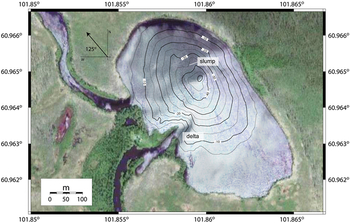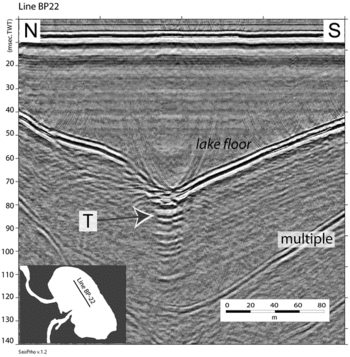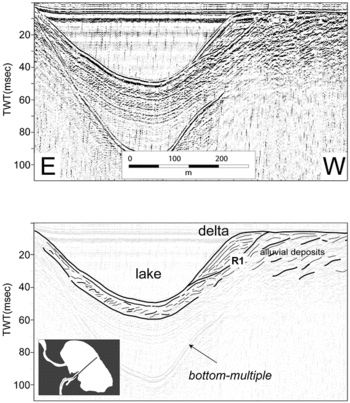It looks like you're using an Ad Blocker.
Please white-list or disable AboveTopSecret.com in your ad-blocking tool.
Thank you.
Some features of ATS will be disabled while you continue to use an ad-blocker.
share:
Italian scientists have found the evidence of what it has happened in the Siberian taiga in 1908. Lake Cheko is the impact crater of the Tunguska
Event and "The Impactor" is buried below 10 meters of sediments at the lake center.
www.agu.org...



It will be very interesting, to dig and to carry in surface a piece of the anomaly buried at the bottom of the lake.
www.agu.org...



A major explosion occurred on 30 June 1908 in the Tunguska region of Siberia, causing the destruction of over 2,000 km2 of taiga; pressure and seismic waves detected as far as 1,000 km away; bright luminescence in the night skies of Northern Europe and Central Asia; and other unusual phenomena. This “Tunguska Event” is probably related to the impact with the Earth of a cosmic body that exploded about 5–10 km above ground, releasing in the atmosphere 10–15 Mton of energy. Fragments of the impacting body have never been found, and its nature (comet or asteroid) is still a matter of debate. We report here results from a magnetic and seismic reflection study of a small (∼500 m diameter) lake, Lake Cheko, located about 8 km NW of the inferred explosion epicenter, that was proposed to be an impact crater left by a fragment of the Tunguska Cosmic Body. Seismic reflection and magnetic data revealed a P wave velocity/magnetic anomaly close to the lake center, about 10 m below the lake floor; this anomaly is compatible with the presence of a buried stony object and supports the impact crater origin for Lake Cheko.
It will be very interesting, to dig and to carry in surface a piece of the anomaly buried at the bottom of the lake.
very nice find, sucks that they'll prolly lie to us and say that a regular rock made its way down there and gave off those readings
That's awesome!
Looks like the impact zone was on a river, the depression would have fileld with water and become a marsh by the time the first exporers reached there a year or 2 after. The destruction was apparent, but they could never find an impact point to confirm theories.
Looks like the impact zone was on a river, the depression would have fileld with water and become a marsh by the time the first exporers reached there a year or 2 after. The destruction was apparent, but they could never find an impact point to confirm theories.
I'm glad i caught this thread, posting to subscribe more than anything, but thanks for posting it. Imagine how much a piece of that rock will fetch
on Ebay.
Thanks for the update! Always a cool subject.
The best part is every show I have seen on this all claim there was no impactor. That idea has been 'discredited'. Now? Either way makes no difference to me but these scientists on TV? Wow, they go at it like they were discussing the virtue of their Mothers.
I can't wait until I can retire from my day job, become an expert, and get on shows.
The best part is every show I have seen on this all claim there was no impactor. That idea has been 'discredited'. Now? Either way makes no difference to me but these scientists on TV? Wow, they go at it like they were discussing the virtue of their Mothers.
I can't wait until I can retire from my day job, become an expert, and get on shows.
Awesome, will be watching where this goes.
Good on the russians, didnt they drill to the bottom of the deepest lake recently? now they're going after tunguska!!
Good on the russians, didnt they drill to the bottom of the deepest lake recently? now they're going after tunguska!!
These vids are from a good documentary on the Tunguska event which shows all the previous research,well worth a watch if you`ve not seen it before
imo...
Pt 1
Pt 2
Pt 3
Pt 1
Pt 2
Pt 3
Hi people,, wasnt there an search party sent out to find the reason for the tenguska incedent??
reply to post by Tekka2
Yes,its all in the vids above your post,they have dredged the swamps and done extensive research into many possibilities as to the cause of the event
Yes,its all in the vids above your post,they have dredged the swamps and done extensive research into many possibilities as to the cause of the event
Seeing as no other 'tunguska event' fragments have ever been found, and knowing that the Earth has constantly been bombarded with asteroids and
comets since it began, even if there turns out to be some asteroid / meteorite fragment buried at the bottom of the lake, i don't see how it could be
proven to be related to the 1908 event one way or the other?
There's lots of possibilities, but in reality testing the overlying sediment for age isn't a certain way of dating it...the fragment could have caused the crater millions of years ago and remained fairly close to the surface, to be exposed and reburied many times.
There's lots of possibilities, but in reality testing the overlying sediment for age isn't a certain way of dating it...the fragment could have caused the crater millions of years ago and remained fairly close to the surface, to be exposed and reburied many times.
This is exciting, at last the 'smoking gun'. I hope this is the answer to one of the great mysteries of science. What caused Tunguska? I have
followed the 'theories' over the years.
I saw a docu. some years ago about this, i don't think is a new discovery.
Something something 2'nd line
Something something 2'nd line
Originally posted by ABNARTY
The best part is every show I have seen on this all claim there was no impactor. That idea has been 'discredited'. Now?
Well, I think they are still saying the object exploded in the atmosphere, but this would be a relatively small fragment from the main body that got blown off and still hit the Earth intact. If they can find pieces of it under the lake it would be a huge discovery. Maybe they could also figure out, then, why no other fragments of it have been found at all, which is very strange if it was a stony body, as there should be millions or even billions of tiny fragments of it all over the region. The object that created Meteor Crater in Arizona created countless pebble-sized fragments all over the region which are found all the time and sold, even, in the gift shop if one ever goes there. I have a tiny sliver of the thing in a drawer somewhere from when I was there in 2001.
Ecellent find OP! I have been fascinated by this event ever since i was in grade school, it would be truely exciting to finally find an answer to this
mystery.
reply to post by samlf3rd
According to him in "The Chariot of the Gods" that occurred from a wave of energy blasted here by another galaxy.
According to him in "The Chariot of the Gods" that occurred from a wave of energy blasted here by another galaxy.
Some people say it was due to Tesla's test firing an energy beam at the North Pole. But he missed..
But i do not believe the explosion of a rock solid comet in the atmosphere. Beause then stil there had to be little fragments laying around. Pieces too small to penetrate the ground should have been found by the first explorers.
Either Tesla stroke this with his beam.. and "exploded" and melted the air and surface.
Or it was a large peice of ICE that came out of space, due to superheating exploded... some pieces hit the earth...
And all the remaining evidence melted away...
But i do not believe the explosion of a rock solid comet in the atmosphere. Beause then stil there had to be little fragments laying around. Pieces too small to penetrate the ground should have been found by the first explorers.
Either Tesla stroke this with his beam.. and "exploded" and melted the air and surface.
Or it was a large peice of ICE that came out of space, due to superheating exploded... some pieces hit the earth...
And all the remaining evidence melted away...
edit on 18-5-2012 by EartOccupant because: (no reason given)
Originally posted by MysterX
Seeing as no other 'tunguska event' fragments have ever been found, and knowing that the Earth has constantly been bombarded with asteroids and comets since it began, even if there turns out to be some asteroid / meteorite fragment buried at the bottom of the lake, i don't see how it could be proven to be related to the 1908 event one way or the other?
It's true that Earth has been constantly bombarded, but that bombardment has slowed down significantly since Earth formed, and many of the objects out there have either coalesced to form planets or been sucked into the gravity wells of the larger solar system bodies like the Sun and Jupiter.
In the mean time, the Earth's crust has been constantly renewing itself, so old falls buried just beneath the surface would have been incorporated into our planet.
On top of this, since the atmosphere formed, it's been stopping all but the largest of objects from impacting the ground with significant force. Most of the large (1-50m) objects that enter our atmosphere break up or "airburst" just as the Tunguska object did, but usually at high enough altitudes that there is very little effect on the ground.
In the case of Tunguska, the airburst was low enough to cause significant damage on the ground, probably due to the low angle of entry. If it had come in at a much higher angle, the forces acting on the object would have been increased, and the object would probably have disintegrated at a much higher altitude, therefore causing much less damage (perhaps even none at all).
I should add that the Tunguska object seems to have been large enough that a significant portion of it survived the airburst, and appears to have left the crater where the lake is. Most objects that frequently enter the atmosphere more or less completely break up at tens of km altitude, and any surviving pieces are usually too small to maintain their momentum, so they hit the ground with relatively little energy.
The point I'm making here, is that lots of things need to "fall into place" before an object will impact the ground - the angle, speed, composition all have to be just right, and in many cases it's not, so although quite sizable objects hit our atmosphere relatively frequently, one that's big enough to make it down to the ground and leave a crater is actually quite a rare thing.
So, if you were to find a meteorite buried just beneath Lake Cheko, that lines up with point where the airburst occurred and with the direction of travel that witnesses reported at the time of the event, that would be very strong evidence that the meteorite was connected to the event that took place in 1908.
edit on 18-5-2012 by FireballStorm because: fixed typo/added a little extra to the post
Originally posted by Mianeye
I saw a docu. some years ago about this, i don't think is a new discovery.
Yes. You are right. This is old news.
The first thread I could find on here mentioning Lake Cheko in the context of the Tunguska event was started over four and a half years ago.
new topics
-
Ireland VS Globalists
Social Issues and Civil Unrest: 28 minutes ago -
Biden "Happy To Debate Trump"
Mainstream News: 59 minutes ago -
RAAF airbase in Roswell, New Mexico is on fire
Aliens and UFOs: 1 hours ago -
What is the white pill?
Philosophy and Metaphysics: 2 hours ago -
Mike Pinder The Moody Blues R.I.P.
Music: 3 hours ago -
Putin, Russia and the Great Architects of the Universe
ATS Skunk Works: 6 hours ago -
A Warning to America: 25 Ways the US is Being Destroyed
New World Order: 10 hours ago
top topics
-
President BIDEN's FBI Raided Donald Trump's Florida Home for OBAMA-NORTH KOREA Documents.
Political Conspiracies: 16 hours ago, 35 flags -
A Warning to America: 25 Ways the US is Being Destroyed
New World Order: 10 hours ago, 18 flags -
Mike Pinder The Moody Blues R.I.P.
Music: 3 hours ago, 7 flags -
What is the white pill?
Philosophy and Metaphysics: 2 hours ago, 5 flags -
Biden "Happy To Debate Trump"
Mainstream News: 59 minutes ago, 5 flags -
RAAF airbase in Roswell, New Mexico is on fire
Aliens and UFOs: 1 hours ago, 4 flags -
Putin, Russia and the Great Architects of the Universe
ATS Skunk Works: 6 hours ago, 2 flags -
Ireland VS Globalists
Social Issues and Civil Unrest: 28 minutes ago, 2 flags
active topics
-
Biden "Happy To Debate Trump"
Mainstream News • 17 • : RazorV66 -
Putin, Russia and the Great Architects of the Universe
ATS Skunk Works • 22 • : SchrodingersRat -
Candidate TRUMP Now Has Crazy Judge JUAN MERCHAN After Him - The Stormy Daniels Hush-Money Case.
Political Conspiracies • 793 • : matafuchs -
University of Texas Instantly Shuts Down Anti Israel Protests
Education and Media • 279 • : cherokeetroy -
Is AI Better Than the Hollywood Elite?
Movies • 22 • : 5thHead -
King Charles 111 Diagnosed with Cancer
Mainstream News • 324 • : Oldcarpy2 -
Ireland VS Globalists
Social Issues and Civil Unrest • 2 • : TimBurr -
President Biden is Angry at A.G. Merrick Garland for Not Being Loyal to the Biden Family.
Above Politics • 20 • : WeMustCare -
RAAF airbase in Roswell, New Mexico is on fire
Aliens and UFOs • 4 • : gortex -
New whistleblower Jason Sands speaks on Twitter Spaces last night.
Aliens and UFOs • 75 • : baablacksheep1
